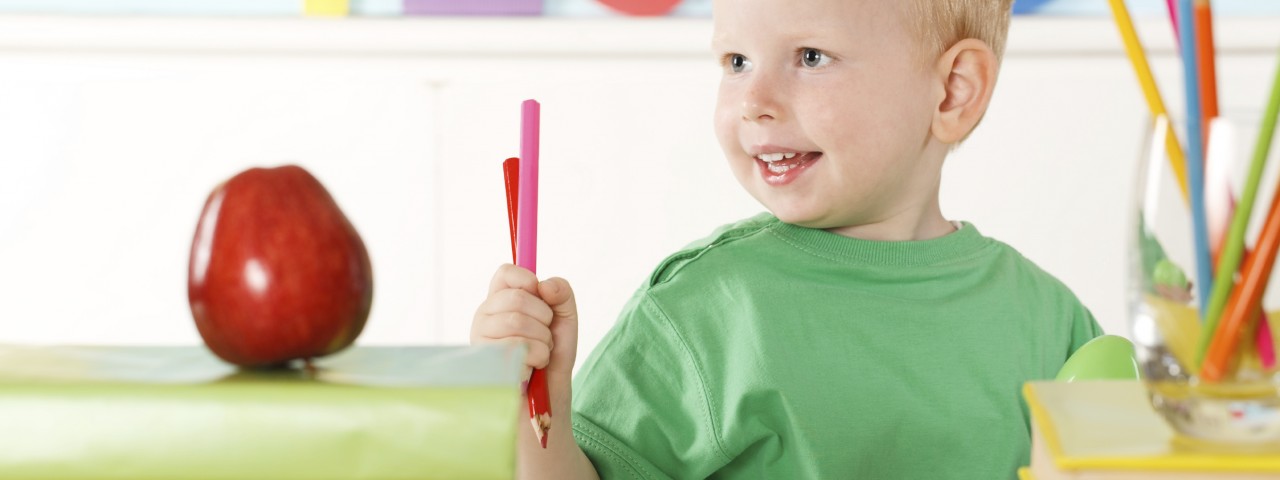How to Prepare Your Family for Kindergarten
- Tweet

The transition to kindergarten can be a stressful time for families and children. To help alleviate this stress, caretakers should prepare their children and themselves for such a transition. Home environments heavily influence a child's school and life outcomes, and a child relies on her family to successfully venture into kindergarten.
When we talk about a kindergarten ready child, we mean that a child has a strong foundation in cognitive skills, language and pre-literacy development, self-control, and self-confidence. But when we talk about a kindergarten-ready family, we mean something a little bit different. A kindergarten-ready family encourages and celebrates these developing skills in their young children.
A key step in kindergarten readiness is learning about routines and schedules. A kindergarten-ready family learn about daily routines, and about the importance of respect for teachers and classmates.
Many schools help new families learn about a new grade or new school. A teacher may call their incoming families before the first day of school, or schedule meetings and classroom tours.1 School-based transition practices in the fall of kindergarten can promote more positive academic achievement scores at the end of kindergarten, especially for children from low and middle socioeconomic families.2 Family involvement before the first day of school may contribute not only to a smooth transition to kindergarten for children, but also for parents who use kindergarten transition practices to get a realistic picture of the school and their child's place within the school.3
At home, a kindergarten-ready family establishes ground rules and properly conveys to their child the differences between acceptable home behavior and acceptable public behavior. At the beginning of kindergarten, children begin commuting daily between two environments with different expectations and rules in terms of behaviors.4 Since children come from a myriad of backgrounds, what may be considered appropriate behavior at home may not be considered appropriate behavior at school. In kindergarten, children are required to begin self-regulating their behavior by internalizing rules and making decisions about appropriate behaviors as they transition between school and home. This behavioral self-regulation is imperative for successful adjustment to the demands of kindergarten,5 and families that develop rules as a family foster mutual respect between adults and children in the household as well as encourage behavioral self-regulation within children.6 Most notably, children who have higher levels of behavioral regulation in the fall of kindergarten show stronger levels of achievement in the spring and better teacher-rated classroom self-regulation.5
A kindergarten ready family also establishes family routines early within a child's daily cycle. The presence of consistent family routines is positively associated with school achievement and attention to school work, while a lack of consistent family routines is associated with problem behaviors in school.7 Kindergarten-ready families adapt their daily routines to accommodate the transition to kindergarten and formal schooling, a process that may invoke a great deal of physiological stress on a family and on kindergartners.8 Consistent family routines provide stability for families, especially during periods of change, stress, and transition, such as kindergarten entry.9 By establishing family routines in line with school-like routines in the summer before kindergarten, a child's and family's transition into kindergarten is eased.10 Predictable kindergarten-ready routines also promote a host of academic and behavioral competencies, which ease children into the kindergarten transition; such routines foster skills like listening, following directions, and regulating behavior.10 Other skills that children gain from experiencing structured routines prior to kindergarten entry include asking for help, completing simple tasks, accepting limits, and taking care of personal needs.11
References:Pianta, R. C., Cox, M., Taylor, L., Early, D. (1999). Kindergarten teachers’ practices related to the transition to school: Results of a national survey. Elementary School Journal, 100, 71-86.
Schulting, A. B. (2005). The effect of school-based kindergarten transition policies and practices on child academic outcomes. Developmental Psychology, 41(6), 860-871.
Kreider, H. (2002). Getting parents “ready” for kindergarten: The role of early childhood education. Family Involvement Network of Educators, Harvard Family Research Project. Available here.
Griebel, W., Niesel, R. (1997). From family to kindergarten: A common experience in a transition perspective. Munich, Germany: State Institute for Early Childhood Education and Research. Available at https://extranet.education.unimelb.edu.au/LED/tec/pdf/griebelniesel3.pdf.
Ponitz, C. C., McClelland, M. M., Matthews, J. S., Morrison, F. J. (2009). A structured observation of behavioral self-regulation and its contribution to kindergarten outcomes. Developmental Psychology, 45(3), 605-619.
DeVries, R., Zan, B. (2003). When children make rules. Educational Leadership, 61(1), 64-67.
Taylor, R. D., Lopez, E. I. (2005). Family management practice, school achievement, and problem behavior in African American adolescents: Mediating processes. Applied Developmental Psychology, 26, 39-49.
Quas, J. A., Murowchick, E., Bensadoun, J., Boyce, T. W. (2002). Predictors of children’s cortisol activation during the transition to kindergarten. Journal of Developmental & Behavioral Pediatrics, 23(5), 304-313.
Britto, P. R., Fuligni, A. S., Brooks-Gunn, J. (2002). Reading, rhymes, and routines: American parents and their young children. Child Rearing in America: Challenges Facing Parents with Young Children, 117-145.
Wildenger, L.L., McIntyre, L. L., Fiese, B. H., Eckert, T.I. (2008). Children’s daily routines during kindergarten transition. Early Childhood Education, 36, 69-74.
Dixon, S. D., Beard, C. School readiness: What teachers expect. What parents can do. Bloomington, Indiana: Indiana Institute on Disability and Community. Available here.
